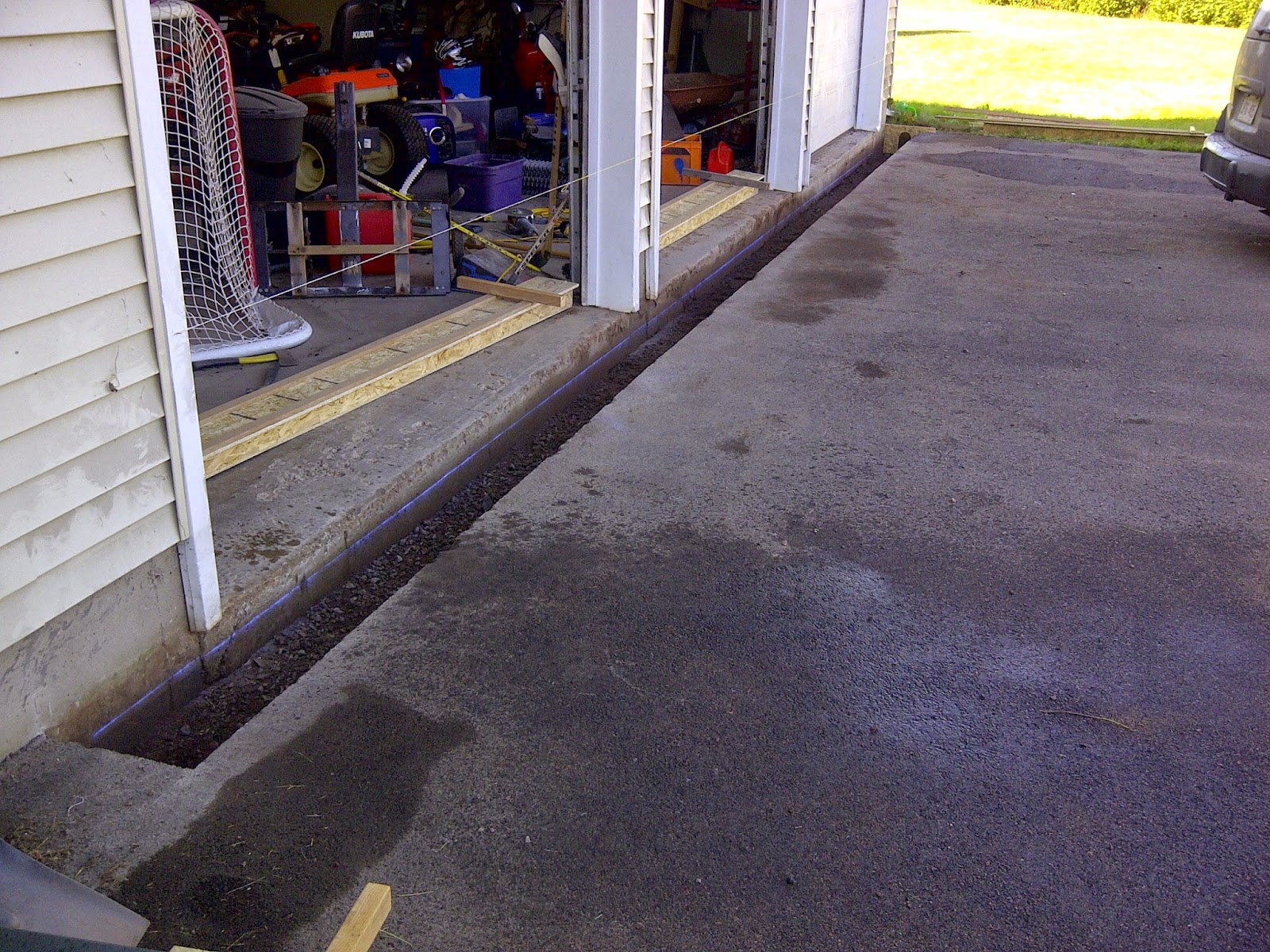Building a trench drain in front of my friend/co-worker's garage
Difficulty Level (Easy, Medium, Hard, Insane):
Easy
Process:
After spending about 15 hours on research and calculations and preparing to actually do the job I went to a scrap yard and scored some galvanized metal grate. They were quite heavy, about 200lbs, 3feet wide and 9 feet long. I cut them into twelve 8" wide by 3' long pieces.
Next thing was building the forms for the actual trench. Normally you buy pre-fabricated channels but since they quoted me $2500 just for the trenches I had to look for some alternative ways to get it done. I ended up building a gradually increasing T-shaped chanel out of 1/2" OSB. I made four 8' pieces and one 4' piece.
On the actual job site, I had to cut the asphalt with a diamond blade. Originally I was going to rent one of those walk-behind saws that you can hook up to a garden hose but since the asphalt was only about 2.5" thick I was able to save 2hrs of driving back and forth to pick up and return the rental machine and use my own angle grinder with my 7" diamond blade. It worked like a charm although I must say that my arms were quite vibrated after the 45 minutes it took me to make the cut.
Next, I used a sledge hammer to demolish the asphalt and then a heavy pick axe to loosen it. After picking up the pieces and wheeling them away in my wheel barrow it was time to use the pick axe again to loosen the gravel underneath.
I measured the correct slope of the trench drain and snapped a chalk line against the side of the existing garage slab to make placing the concrete a bit easier.
Once the gravel was shoveled out and leveled, the ends were capped off and prepared, the pre-fabricated forms were placed in the trench to test I was ready to order the concrete.
Once the concrete showed up I just had to wheel it in with the wheel barrow, level it out with a square shovel, place the pre-fabricated OSB forms and fill in the sides.
Once that was all done, I used a trowel to finish it all up nice and neat. After cleaning the asphalt with a pressure washer my son and I (who helped me out all day) were ready to go home.
After 3 days of letting the concrete cure, Nathaniel and I went back to take out the forms, put in the metal grate, dig the 4" drain tile into the yard as a run-off and clean up. After all was said and done I have to say that it looked pretty darn amazing! I was very proud of my boy and with how the entire job turned out.
Videos:
Pictures:
 |
| Some of my calculations |
 |
| Some of my scouting pictures |
 |
| My daughter helping me out |
 |
| Another view of where it will go |
 |
| The galvanized metal grate I found at the scrap yard |
 |
| Eliana making sure it's acceptable quality |
 |
| After the pieces have been cut up and deburred |
 |
| A close-up of one of the trench forms. The very bottom piece was cut at an angle so it could be removed easily after the concrete was cured |
 |
| Making sure they fit together properly |
 |
| All done and waiting for placement |
 |
| About 15 minutes after we started |
 |
| The asphalt I cracked with the sledge hammer |
 |
| Nathaniel helping me out |
 |
| It was coming out quite nicely |
 |
| Proud helper after we were ready for the concrete pouring |
 |
| Close-up of the change-over to the drain tile |
 |
| After the forms were placed to make sure they fit |
 |
| Cool shot of the chalk line from within the trench |
 |
| Another view of the prepared trench, ready for the concrete |
 |
| Having some lunch while waiting for the concrete truck to show up |
 |
| After the concrete was placed and finish trowled |
 |
| Close-up of the drain exit. The green "T" was to tie the gutter down spout into the drain tile |
 |
| Starting to dig the trench to place the drain tile |
 |
| Nathaniel helping me to remove the forms |
 |
| Half-way done removing the forms |
 |
| Testing the slope with some water |
 |
| After placing the galvanized iron grate |
 |
| After the drain tile was dug into the ground and covered up again |
 |
| Nate posing with the finished project |
 |
| Close-up of the drain |
 |
| Another close-up |
 |
| The finished trench drain |
 |
| Another view |
 |
| And another one |
 |
| Last view |
Angle grinder
Metal cutting blade
Diamond blade
Table saw
Chop saw
Air stapler
Eye protection
Ear protection
Gloves
Square
Markers
Measuring tape
Sledge hammer
Pick axe
Chalk line
Hammer
Level
Jig saw
Drill
Regular shovel
Square shovel
Wheel barrow
Finish trowel
Crow bar
Broom
Materials:
Glue
Nails
Screws
3 sheets of 1/2" OSB
10 strips of 5/8" MDF
Five 16" long 2x2s to hold up OSB forms
String
Time:
Somewhere between 32 and 38 hours
Conclusion:
It looks really nice. We'll find out next spring if it really works as planned

1 comments:
Very nice job. I am not sure I would have started it – good for you for taking the initiative!
Post a Comment